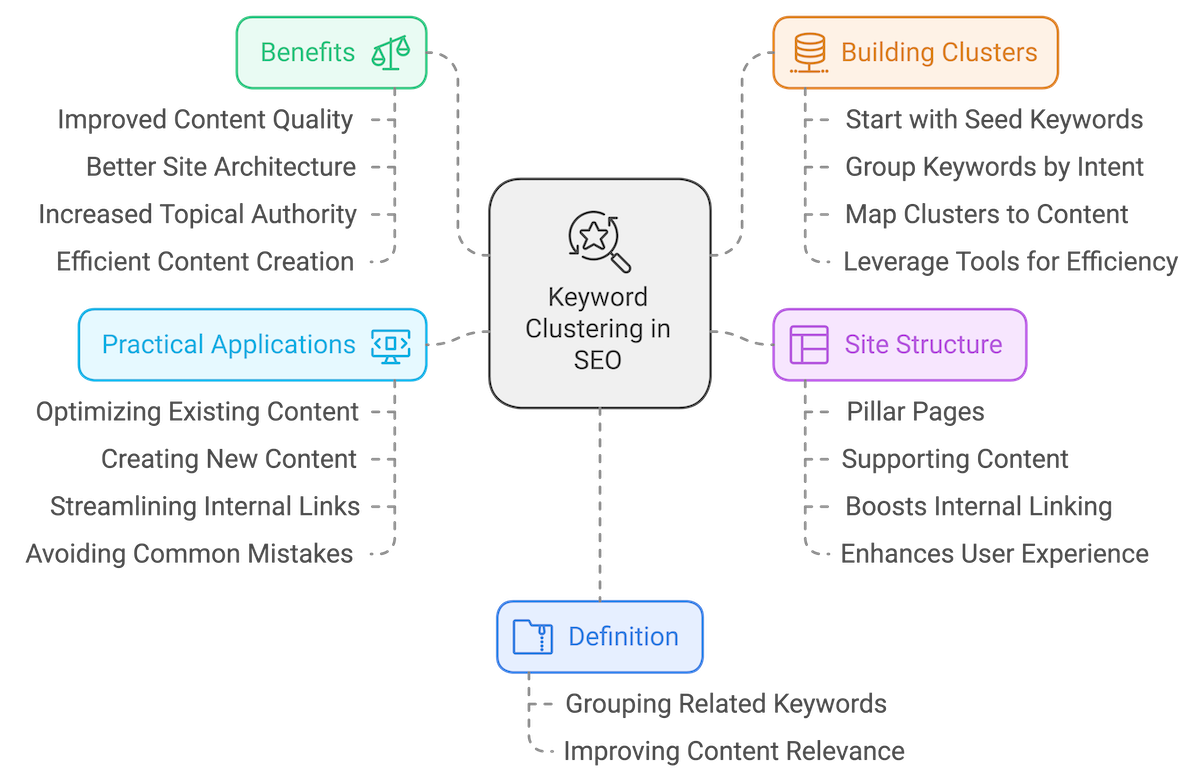The Role of Keyword Clustering in Modern SEO
By: Hayden Jarman

Why isn't your site ranking?
You're probably not alone in asking this. Plenty of businesses struggle with outdated SEO practices that just don't work anymore.
Here's the reality: Google has evolved. It doesn't just look at single keywords; it evaluates context, intent, and connections between topics. That's where keyword clustering becomes critical.
Instead of targeting one keyword per page, clustering groups related terms to create broader, more relevant content. The result? Better rankings, happier users, and a streamlined SEO strategy.
Table of Contents:
- What Is Keyword Clustering?
- Why Keyword Clustering Works
- Building Keyword Clusters
- How Keyword Clusters Shape Site Structure
- Practical Applications of Keyword Clustering
- Avoiding Common Mistakes
- Tools That Simplify Keyword Clustering
- FAQs About Keyword Clustering
- Keyword Clustering in Action
- Final Thoughts
📝 How Strong Is Your Keyword Clustering Strategy? 🌟
Evaluate your SEO skills and get personalized recommendations to improve your keyword clustering strategy!
What Is Keyword Clustering?
Keyword clustering is the process of grouping related keywords to improve content relevance. This strategy organizes your website's topics and makes it easier for search engines and users to connect the dots.
For example, instead of creating a single blog post for "SEO strategy," you'd cluster it with related terms like "semantic SEO," "topic clusters," and "keyword grouping." These terms work together to help your page dominate the search engine results pages (SERPs).
This shift from single keywords to clusters aligns perfectly with how modern algorithms work. Tools like Google RankBrain analyze relationships between terms, rewarding sites that provide well-rounded answers.
Why Keyword Clustering Works
Keyword clustering isn't just a trend---it's the backbone of effective SEO in 2024. Here's why it matters.
Improved Content Quality
Keyword clusters let you tackle topics comprehensively. Instead of offering a one-dimensional view, your content becomes a resource hub. Sites using keyword clustering report a 35% increase in user engagement.
Better Site Architecture
Clusters naturally improve your website's structure. Logical connections between content make it easier for users to navigate and for search engines to crawl.
For example, check out SEO-friendly website development to see how structure impacts rankings.
Increased Topical Authority
Covering multiple facets of a topic establishes you as an expert. Search engines recognize this and prioritize your site in results.
Efficient Content Creation
Clustering highlights gaps in your strategy. You'll know exactly what content to create next, saving time and effort. Learn more about using content calendars strategically.
Building Keyword Clusters
If you're ready to dive into keyword clustering, here's a step-by-step process to get started.
Start with Seed Keywords
Begin by identifying broad, high-volume terms. Use tools like Ahrefs, SEMrush, or Google Search Console to pinpoint these foundational keywords.
| Seed Keyword | Related Terms |
|---|---|
| SEO Strategy | Keyword grouping, semantic SEO, content silos |
| Local SEO | Near me, Google My Business, local citations |
Group Keywords by Intent
Not all keywords serve the same purpose. Some are informational, while others are transactional. Group terms based on what the user intends to achieve.
| Cluster Name | Keywords Included |
|---|---|
| On-Page SEO | Internal linking, meta descriptions |
| Content Hubs | Thematic relevance, SEO content strategy |
Map Clusters to Content
Each keyword cluster should link to specific content on your site. Use pillar pages for broad topics and supporting posts for subtopics.
Leverage Tools for Efficiency
- SEMrush: Automates keyword grouping based on intent.
- AnswerThePublic: Reveals questions users are asking.
- Google Trends: Tracks seasonal and trending topics.
How Keyword Clusters Shape Site Structure
Keyword clustering isn't just for optimizing individual pages. It also transforms your website's architecture.
Pillar Pages and Supporting Content
Think of your website like a tree. Pillar pages are the trunk, providing the main topic. Supporting posts act as the branches, covering subtopics that link back to the pillar.
| Pillar Page | Supporting Pages |
|---|---|
| Guide to SEO Strategy |
This structure:
- Boosts Internal Linking: Helps search engines understand content relationships.
- Enhances User Experience: Makes navigation seamless.
Practical Applications of Keyword Clustering
Keyword clustering isn't just theory. It delivers tangible results when applied effectively.
Optimizing Existing Content
Start with what you already have. Add related keywords to existing posts to make them more relevant. For instance, a blog on "SEO basics" can include terms like "on-page optimization" or "keyword segmentation."
Creating New Content
Clusters reveal gaps in your strategy. If your "local SEO" cluster is missing content on "Google My Business optimization," that's a priority.
Streamlining Internal Links
Use clusters to guide your internal linking. A post on "long-tail keywords" can link to SEO for service businesses and content marketing tips.
Avoiding Common Mistakes
- Overloading Pages with Keywords: Don't stuff keywords unnaturally. It confuses readers and search engines.
- Ignoring User Intent: Make sure every keyword in a cluster serves the same goal.
- Focusing Solely on High-Volume Keywords: Low-competition terms often drive highly targeted traffic. Include them in your clusters.
Tools That Simplify Keyword Clustering
- SEMrush: Automatically groups keywords by intent.
- AnswerThePublic: Surfaces related questions and subtopics.
- Ahrefs: Shows keyword difficulty and search volume.
FAQs About Keyword Clustering
Does keyword clustering work for small businesses?
How many keywords should I include in a cluster?
Can clustering improve local SEO?

Keyword Clustering in Action
| Benefit | Impact |
|---|---|
| Enhanced Content Quality | +35% engagement rates |
| Better Site Architecture | +22% crawl efficiency |
| Increased Topical Authority | +15% domain authority |
Final Thoughts
Keyword clustering isn't just a buzzword. It's a game-changer for SEO. By grouping related terms, you build better content, rank higher, and make your site easier to navigate.
Want to learn more? Check out how to optimize for multiple locations or SEO-friendly website development.
Take control of your strategy today.
Related Posts:
- Understanding Google’s Local Pack: How to Get Featured
- Google Business Profile FAQs: Everything You Need to Know
- The Best Google Ads Extensions to Boost Your Click-Through Rates
- How to Leverage Facebook Groups for Local Business Leads
- How to Use AI to Write Better Social Media Captions
- How to Optimize Google Reviews to Attract More Customers
- LinkedIn for B2B Marketing Success
- How to Conduct a Social Media Audit (w/ "Audit Readiness" Quiz!)
- Creating a Content Calendar for Consistent Posting
- The Importance of Mobile Optimization in 2024
- Data Privacy Regulations: What Marketers Need to Know
- The Role of Chatbots in Enhancing Customer Service
- SEO for Small Business: The Ultimate Guide to Getting Found Online
- The Role of Keyword Clustering in Modern SEO

